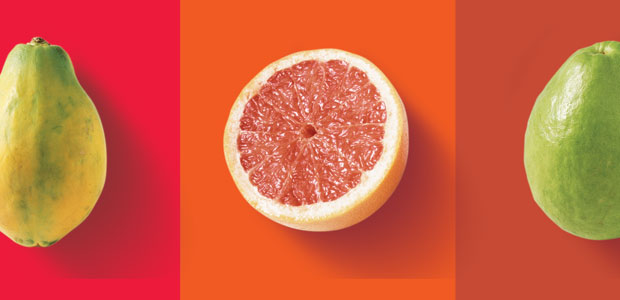Advertisement
Lycopene
Lycopene, a member of the carotenoid family, is a plant pigment that gives tomatoes, watermelons, and papayas their characteristic red colour. Lycopene has enjoyed the limelight recently as a number of studies have suggested that it can play a role in the prevention of cardiovascular disease and certain cancers. Like its relatives, lutein and beta-carotene, … Continued

Lycopene, a member of the carotenoid family, is a plant pigment that gives tomatoes, watermelons, and papayas their characteristic red colour. Lycopene has enjoyed the limelight recently as a number of studies have suggested that it can play a role in the prevention of cardiovascular disease and certain cancers.
Like its relatives, lutein and beta-carotene, lycopene absorbs light and protects cells against photosensitization and free-radical damage. This antioxidant effect has been attributed to the disease prevention benefits of lycopene. Some studies have suggested that lycopene is a more potent free-radical scavenger than other carotenoids.
Lycopene and Cancer
A number of studies have found an association between lycopene intake and a reduced risk of cancer. It is thought that lycopene, as a potent antioxidant, can protect against cell damage, which can lead to cancer. It may also improve cell communication and inhibit tumour growth. Here are highlights of some of the cancer research on lycopene:
Gastric: An Italian study of dietary habits and gastric cancer, published in Experimental Biology and Medicine in 2002, found that consumption of seven or more servings of tomato products per week, compared to less than two servings per week, was associated with a 50 percent reduced risk of gastric cancer.
Lung: Several studies have found an inverse relationship between lycopene and lung cancer. In one study published in the American Journal of Epidemiology in September 2002, those who consumed the highest amount of lycopene had a 28 percent reduced risk of lung cancer.
Prostate: Several studies have reported that lycopene can lower the risk of prostate cancer. A Harvard study reported in the Journal of the National Cancer Institute, in 1995, that men who had the greatest amounts of lycopene in their diet (6.5 milligrams per day or more) had a 21 percent decreased risk of prostate cancer compared with those eating the least. While the exact mechanism for this protection is unknown, a recent animal study suggested that lycopene may inhibit the effects of androgens on the prostate.
Lycopene and Heart Health
Two recent studies have shown that lycopene can also be good for the heart. The American Journal of Clinical Nutrition, in January 2004, reported that researchers at Harvard followed 40,000 women who were free from cardiovascular disease at the start of the study. After nearly five years, 483 cases of heart disease were found. Researchers divided the subjects into four groups, according to plasma lycopene levels, and reviewed the data for associations with heart disease.
Women with plasma lycopene levels higher than the study population average had a 34 percent reduced risk of heart disease compared to those with lower levels. Women with the highest plasma lycopene values (greater than or equal to 21.0 micrograms per/dl) were consuming nearly 10 mg (plus/minus 6 mg) of lycopene per day.
A study published in the Journal of Nutrition in 2003 also found that women with the highest intake of lycopene-rich, tomato-based foods had half the risk for cardiovascular disease compared to women with low intake of those foods.
Lycopene and New Research
Recent research reported in the journal International Urology and Nephrology in 2002 suggested that lycopene can boost sperm concentrations in infertile men. In a preliminary study of 30 men, lycopene improved sperm concentration and motility resulting in six pregnancies following the trial.
In a 12-week study of elderly individuals, a supplement of 15 mg of lycopene was found to boost immune function by increasing natural killer cell activity by 28 percent.
Lycopene in the Diet
Most dietary lycopene is derived from tomato products, although papaya, pink grapefruit, guava, and watermelon also contribute to dietary intake. Lycopene content of tomatoes varies greatly depending on the type and ripeness of the tomato. Unlike other nutrients, heating, cooking, and processing does not reduce the lycopene content of foods. In fact, tomato paste offers greater lycopene absorption than fresh tomatoes. Also, fat seems to enhance lycopene absorption.
Lycopene Supplements
While there isn’t a recommended dietary intake for lycopene, those who do not consume tomato products, yet want the benefits of lycopene, may want to consider a supplement. The usual recommended dosage is 6 to 10 mg daily. Lycopene appears to be very safe. There are no known side effects or drug interactions.




